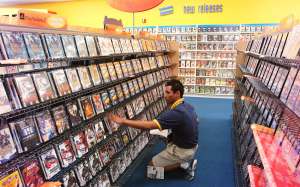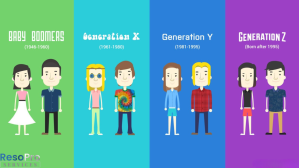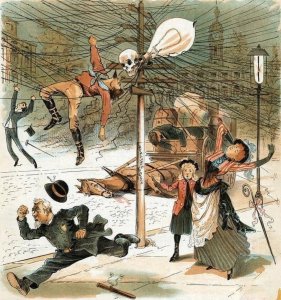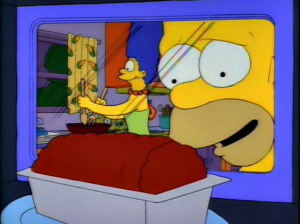Unless you’ve lived under a rock or hard place for the last three decades, you’ll know that the ways we provide and obtain almost everything have changed completely. We have rapidly moved from a world where getting or receiving things took much time and effort to one where it happens instantly, with little effort. We can perform almost any task through the Internet and mobile apps, from shopping, entertainment, reading books, and taking a cab, to banking, dating, booking flights, applying for a job, and then doing that job at home.

Our world – now online
The BI World: A Distant Planet
Some of us are old enough to remember life before the Internet. In this distant world, we wrote letters to others, drove to stores, banks, and video rental stores, used travel agents, printed and mailed resumes and cover letters to apply for jobs that we found in printed newspapers and worked in remote places called offices.
It was a time when if there were two TV shows on simultaneously, and you were out that evening but lucky enough to own a VCR, you had to make the painful choice of which show to record and which to sacrifice – these were dark days, indeed. It was the BI world: Before Internet. We’re now in the AI world: After Internet. (Another AI you may have heard of, Artificial Intelligence, is the most significant change in the AI world.)
Describing the BI world to anyone under 40 is to describe another planet. We now live in a world where everything is “on demand,” a self-indulgent expression. Do we really shout out, “I demand to watch this movie! I demand to buy this widget!” If we do, we’re not as smart as our smart devices – we need to be smarter or have stupider devices. We should not be demanding things but requesting them.

From the ancient archives – a video rental store
Entitled to my entitlements
The fact that many people describe this world as “on-demand” is revealing. It suggests a sense of entitlement and high expectations. When we can’t get what we want, when we want, and where we want, we are outraged: “What do you mean it’s going to take two days to receive the seat cushion I ordered? I need it NOW—don’t you know who I am?” It is a modern-day tragedy of Great Expectations—our on-demand world breeds people with demands.
Micro thinking
This problem is particularly prevalent among young adults ages 18 to 40, a mix of Generation Y and Z, born between the mid-1980s and early 2000s, who grew up with the Internet. One must always be careful when generalizing, however, a common complaint of these individuals is that they are highly demanding and overly sensitive, with their “safe spaces”, “trigger warnings” and “microaggressions.”
I’m all for being respectful toward others, but I don’t understand microaggressions. Microscopes, microchips, and micro-management, I understand, but “microaggressions”? Perhaps I need to take a more macro view.

The generations, from Boomers to Z
Shocking tech
With any new technology, there are benefits, drawbacks, and fears. When electricity was implemented in major cities in the late 1800s, there were fears of electrocution and fire as well as health, cultural and moral concerns. Some even worried electricity would lead to the erosion of traditional values.
Many people had (or have) similar fears about computers, the Internet and Artificial Intelligence. Implementing a new technology has a cost; on-demand technology is no different. However, not implementing a technology also has a cost. Wisdom is recognizing the cost of either decision and choosing carefully based on which choice has the lowest cost relative to its benefits.

Electricity: the source of all evil
The choice is yours…or is it?
One cost to our on-demand world is the excess array of choices. Whether ordering something online, selecting something to watch, or choosing someone on a dating app, we are often overwhelmed by the vast number of options. This leads to the paradox of choice, where too much choice prevents us from choosing. One solution is filters: criteria you select to reduce the number of options. Just as we need “filters” when communicating with others (being wary of people who say they have no filter), filters are essential in taming the wild beast of choice.

Feeling overwhelmed? Just Filter It.
I feel the need, the need for speed
Speed is an essential feature of our on-demand world. Average home internet connections have increased exponentially over the decades, but strangely, they never seem to be fast enough. Our on-demand world demands ever-faster speeds.
In my neighbourhood, workers have been tearing up lawns to install fiber optic cable. Typical cable internet has download speeds up to 500 megabits per second, enough to stream video in 4K. Fiber optic has download speeds up to 10 gigabits, which is an astonishing 10,000 megabits, or up to 20 times faster than cable. But is this needed?

Fiber optics: the wave of the future?
It is for some business. Certain stock trading firms use high-frequency trading (HFT) to trade thousands of stocks every second using powerful computers. These companies often locate their systems near or in the same building as the stock exchange, using a technique called co-location. This practice reduces the data transmission time by a tiny fraction of a second, enough to gain a competitive advantage when trading.
However, most users do not need this level of speed. 25 to 50 megabits per second is enough to stream 4K. Having 10,000 megabits per second is like using a chainsaw to cut butter, but, again, in our on-demand world, people always want more; the optics of fiber optics are not good.
It’s a good thing there’s a speed limit on data – a maximum velocity beyond which information cannot travel any faster: the speed of light, or about 300,000 km per second. If this speed limit did not exist, people would forever demand faster speeds, taking pleasure in knowing they could download their entire Netflix library in a billionth of a second – because a millionth of a second just wouldn’t do. As Homer Simpson said when he was hungry waiting for dinner: “Isn’t there anything faster than a microwave?”

Homer waits an excruciating 8 more seconds for his meal
Spin doctors
One area of science appears to break this speed limit: the mysterious world of quantum mechanics – the study of subatomic particles. One fascinating aspect of this field is quantum entanglement, a bizarre phenomenon in which two particles appear to be linked. If you measure an aspect of one particle, the other takes on the opposite aspect.
For example, one aspect of a particle is its spin, which can be up or down. The moment you see one particle spinning up, you would immediately see the other particle spinning down, even if the two particles were light years apart. It is as though one particle communicates with the other instantaneously, faster than light. Unfortunately, there are no practical applications, so we still have a failure to communicate.

Particle 1: “Hey, what’s up?” Particle 2: “You are.”
Time travel 101
However, companies have found a way to break the speed limit and satisfy our demands faster than light or any speed. How? The only way to be faster than any speed is to be so fast that you go back in time.
Imagine you order a product, and it arrives in two days. You order another product that arrives in one day, obviously faster. The math is simple: the fewer days, the quicker the product arrives.
Looking at it mathematically, we have:
- Scenario A: 2 days
- Scenario B: 1 day (1 less than above)
Now, the question is: how small can you make the number of days? By continuing to subtract the number of days, as follows:
Scenario C: -1 day (2 days less than above)
Wait a minute, how can a product arrive one day before you want it? Here is where we enter the weird world of algorithms. Algorithms are rules that companies use, among other things, to anticipate demand. Amazon uses algorithms to suggest products you may want based on your previous orders. You may buy something before you even realize you want it, a form of reverse time travel. Not “back to the future” but “future to the back.”
The danger is that we buy more stuff than we need because it is so easy. User Experience (UX) experts earn high salaries by removing the “friction points” in the online sales process. So much friction has been removed that buying something is as frictionless as oil on water. As a result, we are buried in a mountain of products, and the things we own end up owning us.

The joys of online shopping
Black holes, now on demand
Amazon is clearly the behemoth of the on-demand world, with a staggering 37% of all online sales, more than all its nearest competitors (including Walmart, Apple, eBay and Best Buy) combined. Amazon resembles one of the strangest objects in our universe: black holes.
Black holes are stars that have collapsed into a small core with incredible mass and density. Their gravitational pull is so intense that even light cannot escape. Amazon has a similar pull on all of us—although it does not destroy us as a black hole would, its pull on consumers and other businesses is enormous.
A black hole contains an event horizon, the boundary from which nothing escapes. Many of us have already passed Amazon’s event horizon. We are trapped in their online world, making switching to other retailers difficult.
As you approach the event horizon, a strange thing happens. Because of the black hole’s tremendous gravity, time slows down. As a space traveller venturing into the black hole, you would not notice this, but anyone on Earth observing you would see you moving more slowly until, eventually, with infinite gravity, you would be frozen in time forever. However, from your perspective, looking back at the Earth, everything there would seem to move faster and faster – until you see the end of time. This is all theoretical; gravity would tear you into spaghetti before you could see anything – bummer.

A black hole: Amazon of the universe
What time is it?
In the same way time slows down near a black hole, time slows down in our on-demand world as we expect ever-faster Internet connections, services and responses. In addition, just as a black hole concentrates mass at its center, Amazon concentrates enormous resources, including millions of products and vast distribution centres. Finally, just as a black hole grows by consuming anything that comes close to it (including stars and planets), Amazon has consumed hundreds of small companies, and it keeps growing, with revenues in 2023 of over $500 billion US.
Information lost and found
Amazon is not the only area of our on-demand world that is a black hole. Have you ever applied for a job online or waited in vain for a response from someone through email or texting, spending hours crafting your message, sending it, and never hearing back from the company or person? All your carefully crafted information seems to disappear into a black hole, never to see the light of day.
There is a debate within physics about whether a black hole can destroy information. Classical physics says that once something is trapped inside a black hole, the object is lost forever with all its information. However, this contradicts quantum mechanics, which says that information can never be destroyed. This contradiction is known as the black hole information paradox. Scientists have proposed various ways to resolve it, which are abstract and impossible to prove.

Destroyed information – lost forever?
Reality: what a concept
Returning to planet Earth and the dilemma of unanswered requests: the solution is simple: connect with others in person. Forget virtual reality: practice actual reality. Even a video or phone call is better than no call at all. There are also things called meetings, events, gatherings and conferences, where human beings meet in person – maybe you’ve heard of them?
Reality resolves many of the pitfalls of our on-demand world: our speed addiction, our expectations of immediate gratification, the excess choices and the perceived loss of information.
We need to slow down, connect with others, and realize that a human connection beats a wi-fi connection. The only thing we should demand is more from ourselves.

The ultimate connection

You must be logged in to post a comment.